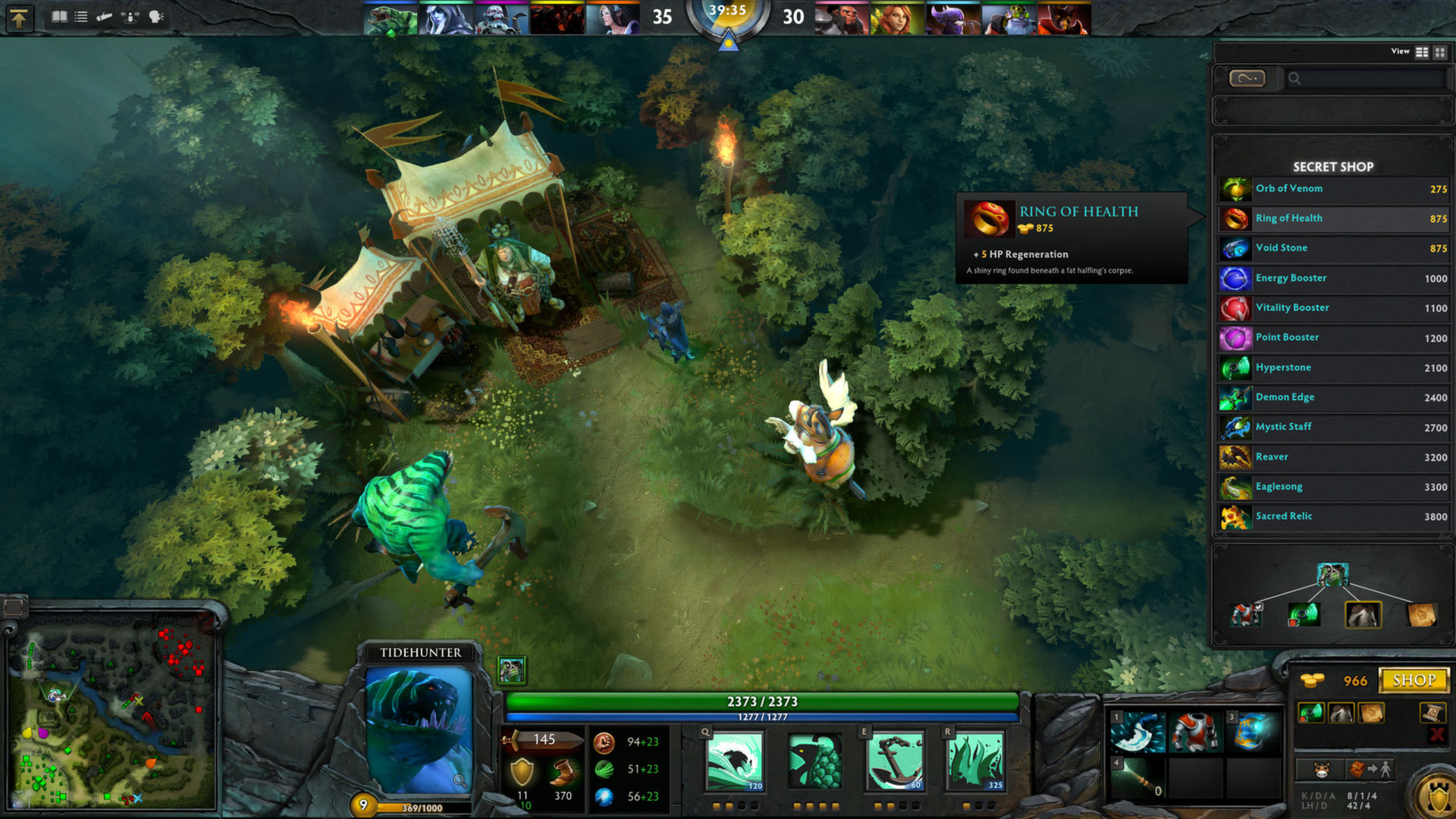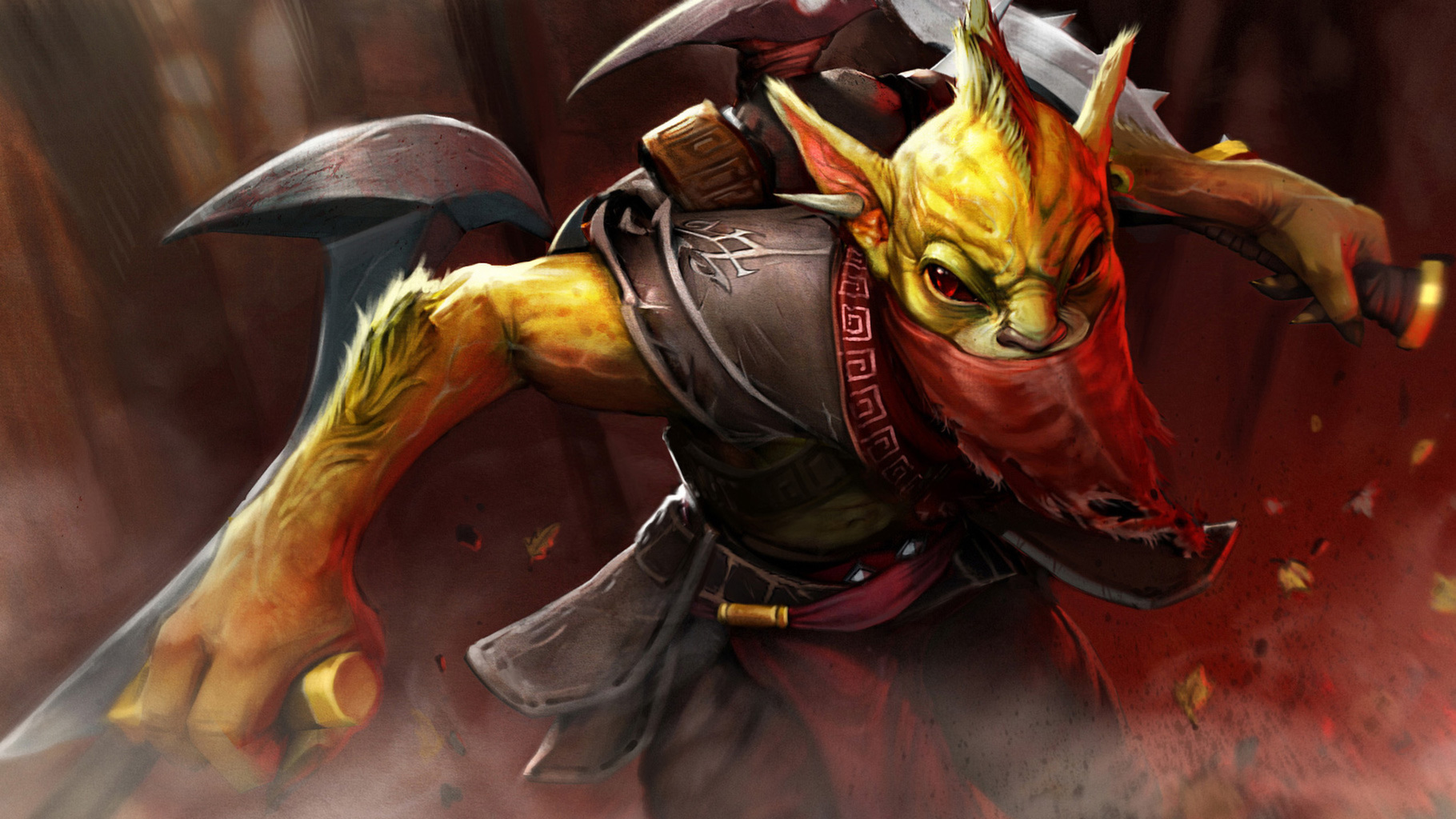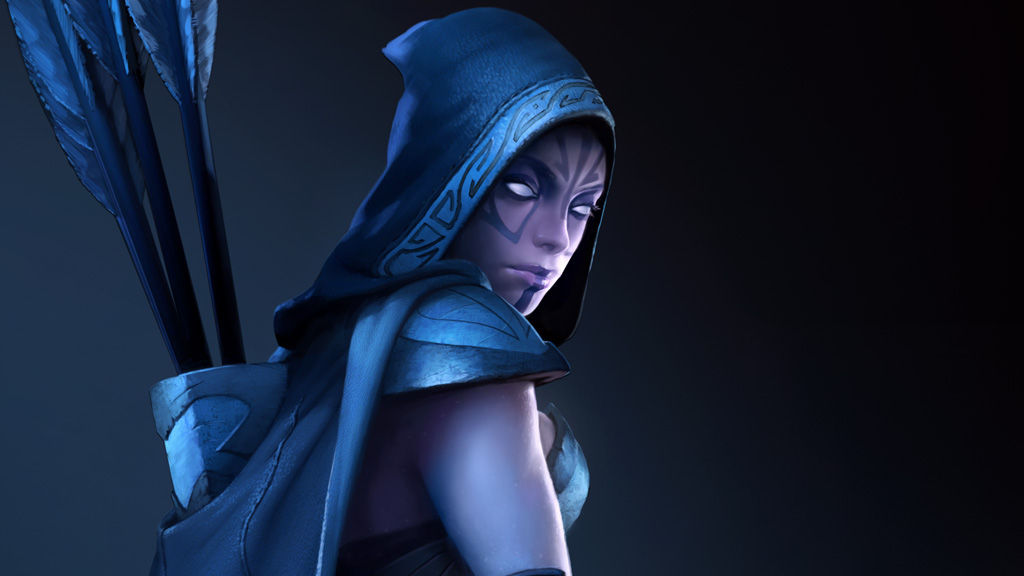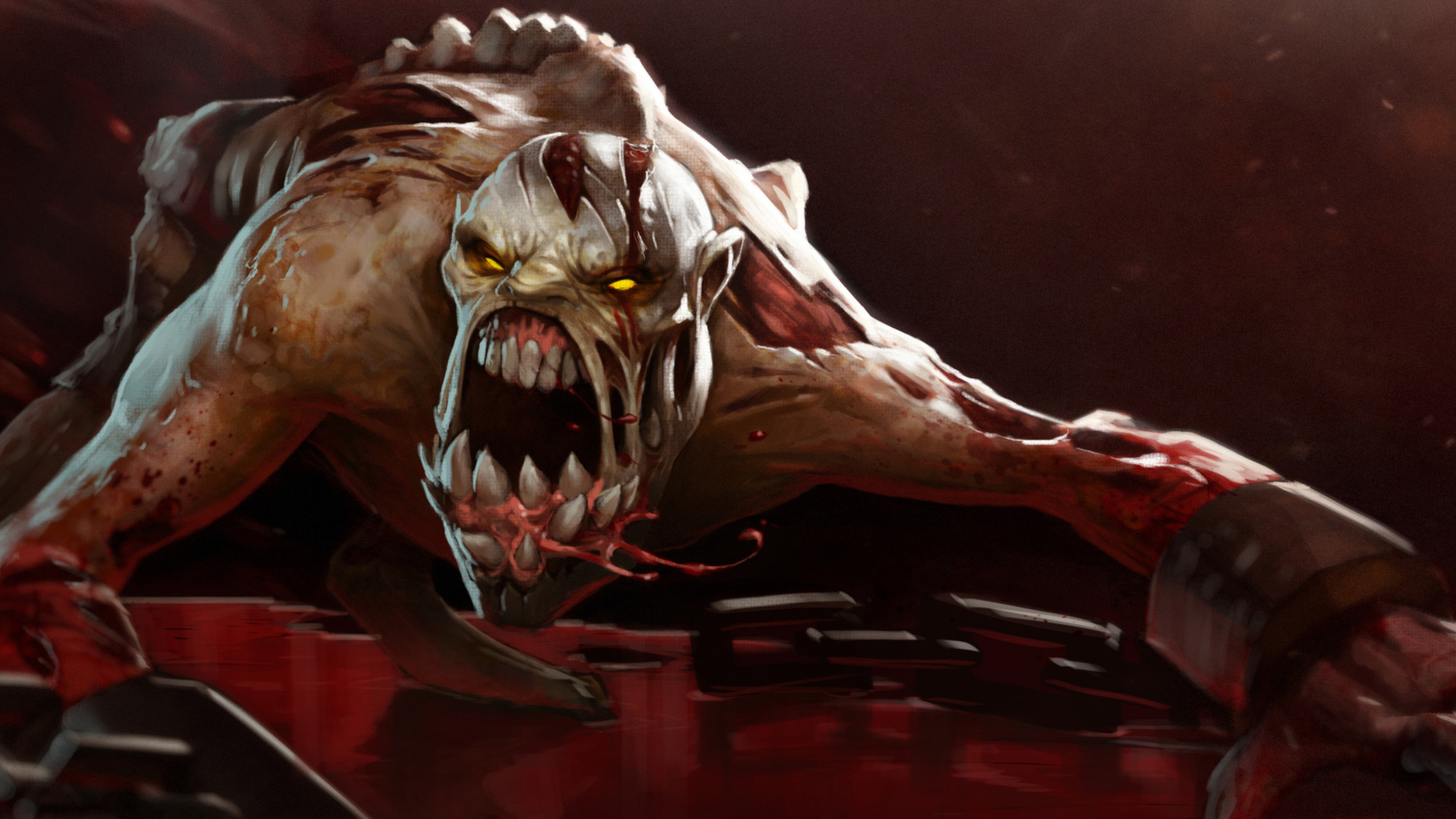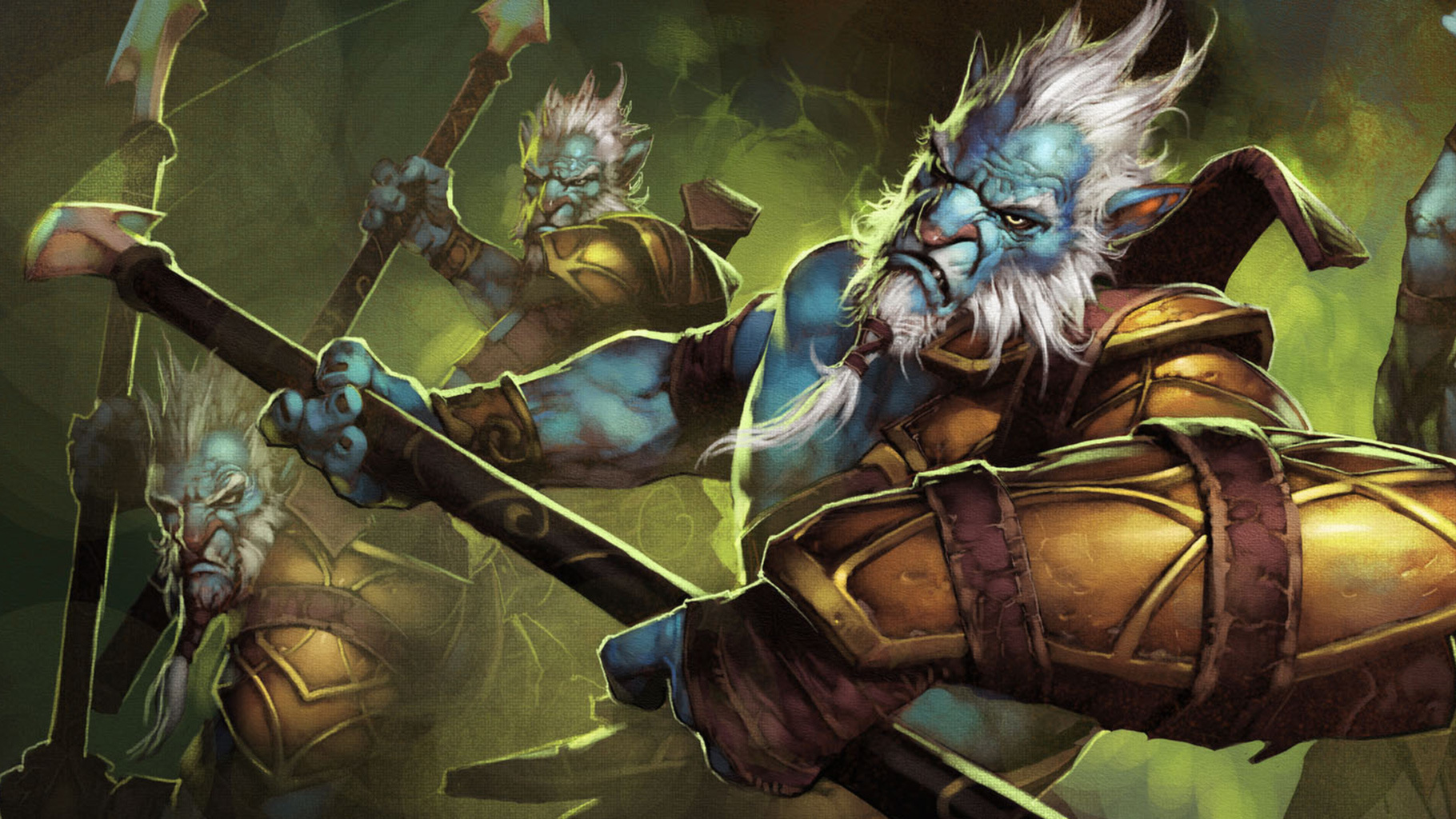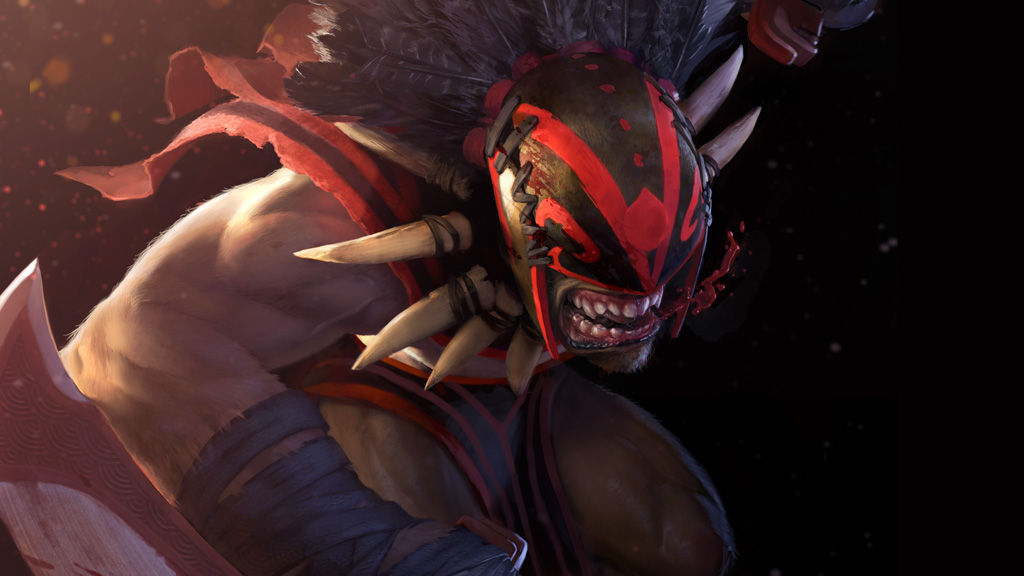Dota is a competitive game of action and strategy, played both professionally and casually by millions of passionate fans worldwide. Players pick from a pool of over a hundred heroes, forming two teams of five players. Radiant heroes then battle their Dire counterparts to control a gorgeous fantasy landscape, waging campaigns of cunning, stealth, and outright warfare.
Irresistibly colorful on the surface, Dota is a game of infinite depth and complexity. Every hero has an array of skills and abilities that combine with the skills of their allies in unexpected ways, to ensure that no game is ever remotely alike. This is one of the reasons that the Dota phenomenon has continued to grow. Originating as a fan-made Warcraft 3 modification, Dota was an instant underground hit. After coming to Valve, the original community developers have bridged the gap to a more inclusive audience, so that the rest of the world can experience the same core gameplay, but with the level of polish that only Valve can provide.
Get a taste of the game that has enthralled millions.
Irresistibly colorful on the surface, Dota is a game of infinite depth and complexity. Every hero has an array of skills and abilities that combine with the skills of their allies in unexpected ways, to ensure that no game is ever remotely alike. This is one of the reasons that the Dota phenomenon has continued to grow. Originating as a fan-made Warcraft 3 modification, Dota was an instant underground hit. After coming to Valve, the original community developers have bridged the gap to a more inclusive audience, so that the rest of the world can experience the same core gameplay, but with the level of polish that only Valve can provide.
Get a taste of the game that has enthralled millions.
Gameplay Patch 7.35d And Matchmaking Features
Over the last year or so, we've taken a number of visible actions against users of third-party cheats. As we investigate each cheat, we're primarily focused on understanding what they're doing and how we can track and stop it. But while we're doing that, we also ask ourselves why some cheaters feel compelled to use these tools in the first place. The most common explanation is "to get an unfair advantage", which obviously runs counter to the desires of the Dota community and the sense of competitiveness and fairness at its heart. Even so, sometimes there are still things we can learn, and use to improve the Dota experience for everyone (or at least everyone who hasn't been banned for cheating).
Pre-game hero bans are an example of this. Many cheats last year focused on gaining an advantage during the ten-second hero ban phase at the start of each game. We stepped back to look at the original goals of this phase letting players express a preference for what heroes they didn't want to play against, but without creating scenarios where players with small hero pools get permanently locked out looked at some data, and asked if there was a way we could better serve these goals while solving other problems at the same time.

With today's update, we've removed the start-of-match ban phase and replaced it with ban preferences stored with your account. If you load the heroes tab, you can select the four heroes you don't want to see in your games. You're guaranteed when you join a matchmaking game that at least one of them will be banned. You can change your list of banned heroes whenever you want. (If you leave some ban slots empty, it's possible the empty slot will be selected as your "banned hero". In other words, there's no advantage to leaving slots empty.)
This new system addresses a number of problems the previous system had: you can't forget to ban; you don't have to learn that sometimes suggested bans are ignored by the game; you're not on a tight clock to make a stressful decision that, in the end, most players make the same way almost all the time. As an added bonus, it also makes targeted bans impossible, whether those bans are against known personalities or random players in a pub match for which you've looked up data.
Some game modes (ie., Captains Mode, Captains Draft, Ability Draft, Turbo) either didn't have a pre-game ban phase, or already had non-standard ban rules. These modes are unchanged.
Millions of Dota players interact with the matchmaker every day and every single one has different priorities when looking for a game. Some prefer to get into a match as quickly as possible, and are willing to accept a higher skill variance in the game to save some time. Others want every match to be perfectly balanced, and are willing to wait longer for the best chance at the closest game. Other players care less about the skill level of the other players, and much more about their personality and behavior in-game.
We've long wanted to build features to let players find matches that better align with their individual preferences. Early attempts ran into two main problems:
Within the new experimental umbrella of Dota Labs, and initially limited to Dota Plus, we're shipping a first pass of a feature that Dota players have been asking us for forever: When you find a match in Dota, Dota Plus will present some information about how the matchmaker evaluated the match, like an estimate of skill range and player behavior scores. You'll have a chance to accept that match or requeue to wait for a match that's better for you and your current preferences.
We were careful when building this feature to make sure that any information we included would enable players to express individual preferences about what kinds of matches they prefer, but not grant a competitive advantage of any kind. The new dialog can tell you that the skill variance of players in a match is high or low, but not whether you and your team are on the high end or the low end.
Why is this a Dota Labs feature? The only way to know for sure how millions of Dota players are going to interact with a feature is to ship it, so that's what we're doing. We've done extensive modeling, but there's still real risk here: We may be wrong about how players will use this feature or how it will affect the overall matchmaking experience in Dota. We don't want to let those fears that we might be wrong stop us from doing something that may benefit millions of Dota players, so we're shipping this as an experiment. Shipping it inside Dota Plus limits access, and accordingly limits the risk to Dota as we learn about how everyone interacts with it. As with the other Dota Labs features, time and your feedback will tell whether it grows, or changes, or gets retired.
We know many of you are looking forward to Crownfall, and we're looking forward to getting it into your hands. We're wrapping things up and expect to release in mid-April. We'll see you then.

We've just released Gameplay Patch 7.35d (Chen had it coming), and with it a new set of features.
Matchmaking Hero Ban Rework
Over the last year or so, we've taken a number of visible actions against users of third-party cheats. As we investigate each cheat, we're primarily focused on understanding what they're doing and how we can track and stop it. But while we're doing that, we also ask ourselves why some cheaters feel compelled to use these tools in the first place. The most common explanation is "to get an unfair advantage", which obviously runs counter to the desires of the Dota community and the sense of competitiveness and fairness at its heart. Even so, sometimes there are still things we can learn, and use to improve the Dota experience for everyone (or at least everyone who hasn't been banned for cheating).
Pre-game hero bans are an example of this. Many cheats last year focused on gaining an advantage during the ten-second hero ban phase at the start of each game. We stepped back to look at the original goals of this phase letting players express a preference for what heroes they didn't want to play against, but without creating scenarios where players with small hero pools get permanently locked out looked at some data, and asked if there was a way we could better serve these goals while solving other problems at the same time.

With today's update, we've removed the start-of-match ban phase and replaced it with ban preferences stored with your account. If you load the heroes tab, you can select the four heroes you don't want to see in your games. You're guaranteed when you join a matchmaking game that at least one of them will be banned. You can change your list of banned heroes whenever you want. (If you leave some ban slots empty, it's possible the empty slot will be selected as your "banned hero". In other words, there's no advantage to leaving slots empty.)
This new system addresses a number of problems the previous system had: you can't forget to ban; you don't have to learn that sometimes suggested bans are ignored by the game; you're not on a tight clock to make a stressful decision that, in the end, most players make the same way almost all the time. As an added bonus, it also makes targeted bans impossible, whether those bans are against known personalities or random players in a pub match for which you've looked up data.
Some game modes (ie., Captains Mode, Captains Draft, Ability Draft, Turbo) either didn't have a pre-game ban phase, or already had non-standard ban rules. These modes are unchanged.
Dota Plus Pre-Match Matchmaker Analytics
Millions of Dota players interact with the matchmaker every day and every single one has different priorities when looking for a game. Some prefer to get into a match as quickly as possible, and are willing to accept a higher skill variance in the game to save some time. Others want every match to be perfectly balanced, and are willing to wait longer for the best chance at the closest game. Other players care less about the skill level of the other players, and much more about their personality and behavior in-game.
We've long wanted to build features to let players find matches that better align with their individual preferences. Early attempts ran into two main problems:
- First, while players are good at describing their preferences to other people, they aren't necessarily good at describing their preferences as inputs to a complex, global matchmaking algorithm ("I value skill variance 13% higher than the average Dota player!"). How can we create tools that let players express their preferences naturally and directly?
- Second, changes to the matchmaker affect all Dota players, so we tend toward caution. The matchmaker is always trying to strike a balance between individual player preferences and the health of Dota as a whole. (If matches of Dota are bad, whether because of wild skill gaps or poor player behavior, that's bad for Dota as a community. If every match is perfect, but takes three hours to form, that's bad, too.) New matchmaker features available to everyone at once risk breaking the matchmaker, and if we break the matchmaker, we break Dota. How can we ship new matchmaking features and learn how they work in practice while keeping risk to Dota as a whole low?
Within the new experimental umbrella of Dota Labs, and initially limited to Dota Plus, we're shipping a first pass of a feature that Dota players have been asking us for forever: When you find a match in Dota, Dota Plus will present some information about how the matchmaker evaluated the match, like an estimate of skill range and player behavior scores. You'll have a chance to accept that match or requeue to wait for a match that's better for you and your current preferences.
We were careful when building this feature to make sure that any information we included would enable players to express individual preferences about what kinds of matches they prefer, but not grant a competitive advantage of any kind. The new dialog can tell you that the skill variance of players in a match is high or low, but not whether you and your team are on the high end or the low end.
Why is this a Dota Labs feature? The only way to know for sure how millions of Dota players are going to interact with a feature is to ship it, so that's what we're doing. We've done extensive modeling, but there's still real risk here: We may be wrong about how players will use this feature or how it will affect the overall matchmaking experience in Dota. We don't want to let those fears that we might be wrong stop us from doing something that may benefit millions of Dota players, so we're shipping this as an experiment. Shipping it inside Dota Plus limits access, and accordingly limits the risk to Dota as we learn about how everyone interacts with it. As with the other Dota Labs features, time and your feedback will tell whether it grows, or changes, or gets retired.
Onward
We know many of you are looking forward to Crownfall, and we're looking forward to getting it into your hands. We're wrapping things up and expect to release in mid-April. We'll see you then.
[ 2024-03-21 22:32:58 CET ] [Original Post]
Minimum Setup
- OS: Ubuntu 12.04 or newer
- Processor: Dual core from Intel or AMD at 2.8 GHzMemory: 4 GB RAM
- Memory: 4 GB RAM
- Graphics: AMD GCN+. NVIDIA Kepler+. or Intel HD 5000-series or newerNetwork: Broadband Internet connection
- Storage: 60 GB available space
GAMEBILLET
[ 6417 ]
FANATICAL
[ 7150 ]
GAMERSGATE
[ 3628 ]
MacGameStore
[ 4850 ]
FANATICAL BUNDLES
HUMBLE BUNDLES
by buying games/dlcs from affiliate links you are supporting tuxDB

